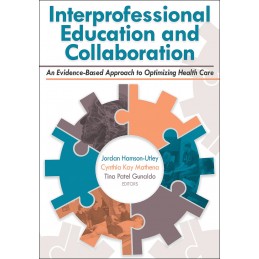Interprofessional Education and Collaboration:: An Evidence-Based Approach to Optimizing Health Care is a groundbreaking text in the field of interprofessional education (IPE) and interprofessional collaborative practice (IPCP).
As the health care industry continues to grow, it is critical that those entering health care careers possess interprofessional competency and a collaborative skill set. As such, the World Health Organization and academic program accreditors have amplified their calls for interprofessional training. This text guides the reader through the core competencies for interprofessional collaborative practice that have been set by the Interprofessional Education Collaborative (IPEC) and takes an inclusive approach to the education standards set by professional programs that are members of the Health Professions Accreditors Collaborative (HPAC), including the Commission on Accreditation of the Athletic Training Education (CAATE).
Authored by a team of experts representing seven health care professions, this text uses simple definitions and uniform terminology to supply a foundational basis for IPE and IPCP. Introductory topics include building professional knowledge of self and others, creating a culture for teams, building interprofessional relationships, and fostering collaboration. Later chapters move beyond the basics to provide guidance in leading interprofessional teams, managing conflict, and sustaining the interprofessional effort.
Interprofessional Education and Collaboration offers a unique pedagogical structure that links IPE concepts with IPCP strategies by connecting research with evidence-based practices. Case studies create opportunities to assimilate and discuss IPE concepts. To optimize student engagement and comprehension, each chapter contains the following valuable learning aids::
- Each chapter begins with a Case Study that presents a realistic IPCP scenario. At the close of each chapter, the case study is revisited to apply the chapter themes to the case study, and three to five discussion questions are supplied.
- Collaborative Corner sidebars aid comprehension with reflective questions or statements related to chapter topics. This feature will facilitate collaborative learning as students share their interprofessional perspectives.
- Tools of IPE sidebars equip readers with resources such as surveys, inventories, and activities to implement in their daily practice.
- EBP of Teamship sidebars showcase contemporary research articles and findings. This feature reinforces the connection between IPE and IPCP by summarizing relevant research and supplying corresponding evidence-based IPCP strategies.
As leading health care institutions continue to prioritize IPE and IPCP, educators have a responsibility to shape the future of health care through an interprofessional curriculum.
Interprofessional Education and Collaboration is focused on developing a dual identity that leads to intentional behaviors designed to improve patient outcomes through IPCP. Readers will conclude this text with a firm understanding of IPE concepts and IPCP implementation strategies that aim to create change in daily practice and improve the impact of health care.


 Dostawa
Dostawa
 Płatność
Płatność
 Zwroty
Zwroty
